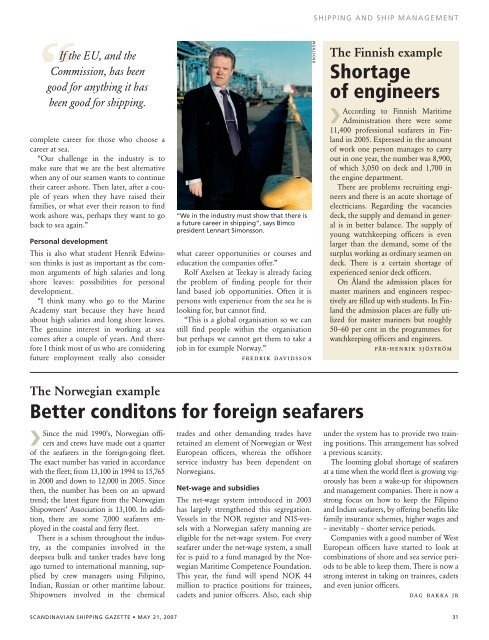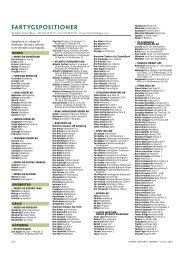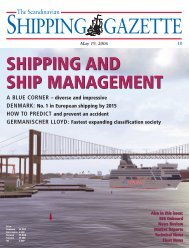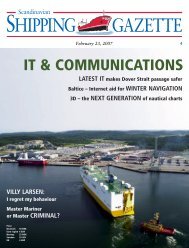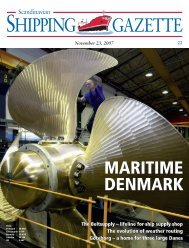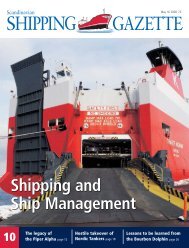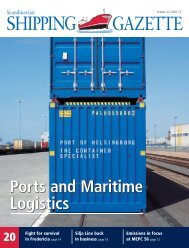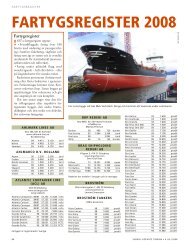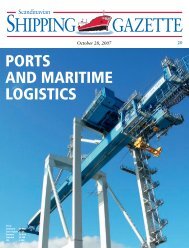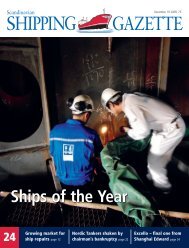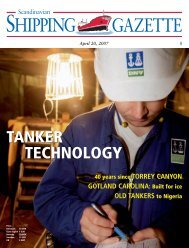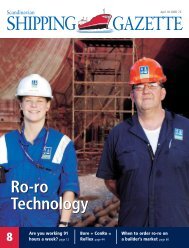SSG No 10 - Shipgaz
SSG No 10 - Shipgaz
SSG No 10 - Shipgaz
Create successful ePaper yourself
Turn your PDF publications into a flip-book with our unique Google optimized e-Paper software.
If the EU, and the<br />
Commission, has been<br />
good for anything it has<br />
been good for shipping.<br />
complete career for those who choose a<br />
career at sea.<br />
“Our challenge in the industry is to<br />
make sure that we are the best alternative<br />
when any of our seamen wants to continue<br />
their career ashore. Then later, after a couple<br />
of years when they have raised their<br />
families, or what ever their reason to find<br />
work ashore was, perhaps they want to go<br />
back to sea again.”<br />
Personal development<br />
This is also what student Henrik Edwinsson<br />
thinks is just as important as the common<br />
arguments of high salaries and long<br />
shore leaves: possibilities for personal<br />
development.<br />
“I think many who go to the Marine<br />
Academy start because they have heard<br />
about high salaries and long shore leaves.<br />
The genuine interest in working at sea<br />
comes after a couple of years. And therefore<br />
I think most of us who are considering<br />
future employment really also consider<br />
❯<br />
Since the mid 1990’s, <strong>No</strong>rwegian officers<br />
and crews have made out a quarter<br />
of the seafarers in the foreign-going fleet.<br />
The exact number has varied in accordance<br />
with the fleet; from 13,<strong>10</strong>0 in 1994 to 15,765<br />
in 2000 and down to 12,000 in 2005. Since<br />
then, the number has been on an upward<br />
trend; the latest figure from the <strong>No</strong>rwegian<br />
Shipowners’ Association is 13,<strong>10</strong>0. In addition,<br />
there are some 7,000 seafarers employed<br />
in the coastal and ferry fleet.<br />
There is a schism throughout the industry,<br />
as the companies involved in the<br />
deepsea bulk and tanker trades have long<br />
ago turned to international manning, supplied<br />
by crew managers using Filipino,<br />
Indian, Russian or other maritime labour.<br />
Shipowners involved in the chemical<br />
“We in the industry must show that there is<br />
a future career in shipping”, says Bimco<br />
president Lennart Simonsson.<br />
what career opportunities or courses and<br />
education the companies offer.”<br />
Rolf Axelsen at Teekay is already facing<br />
the problem of finding people for their<br />
land based job opportunities. Often it is<br />
persons with experience from the sea he is<br />
looking for, but cannot find.<br />
“This is a global organisation so we can<br />
still find people within the organisation<br />
but perhaps we cannot get them to take a<br />
job in for example <strong>No</strong>rway.”<br />
fredrik davidsson<br />
The <strong>No</strong>rwegian example<br />
Better conditons for foreign seafarers<br />
trades and other demanding trades have<br />
retained an element of <strong>No</strong>rwegian or West<br />
European officers, whereas the offshore<br />
service industry has been dependent on<br />
<strong>No</strong>rwegians.<br />
Net-wage and subsidies<br />
The net-wage system introduced in 2003<br />
has largely strengthened this segregation.<br />
Vessels in the NOR register and NIS-vessels<br />
with a <strong>No</strong>rwegian safety manning are<br />
eligible for the net-wage system. For every<br />
seafarer under the net-wage system, a small<br />
fee is paid to a fund managed by the <strong>No</strong>rwegian<br />
Maritime Competence Foundation.<br />
This year, the fund will spend NOK 44<br />
million to practice positions for trainees,<br />
cadets and junior officers. Also, each ship<br />
SHIPPING AND SHIP MANAGEMENT<br />
under the system has to provide two training<br />
positions. This arrangement has solved<br />
a previous scarcity.<br />
The looming global shortage of seafarers<br />
at a time when the world fleet is growing vigorously<br />
has been a wake-up for shipowners<br />
and management companies. There is now a<br />
strong focus on how to keep the Filipino<br />
and Indian seafarers, by offering benefits like<br />
family insurance schemes, higher wages and<br />
– inevitably – shorter service periods.<br />
Companies with a good number of West<br />
European officers have started to look at<br />
combinations of shore and sea service periods<br />
to be able to keep them. There is now a<br />
strong interest in taking on trainees, cadets<br />
and even junior officers.<br />
dag bakka jr<br />
SCANDINAVIAN SHIPPING GAZETTE • MAY 21, 2007 31<br />
BROSTRÖM<br />
The Finnish example<br />
Shortage<br />
of engineers<br />
❯<br />
According to Finnish Maritime<br />
Administration there were some<br />
11,400 professional seafarers in Finland<br />
in 2005. Expressed in the amount<br />
of work one person manages to carry<br />
out in one year, the number was 8,900,<br />
of which 3,050 on deck and 1,700 in<br />
the engine department.<br />
There are problems recruiting engineers<br />
and there is an acute shortage of<br />
electricians. Regarding the vacancies<br />
deck, the supply and demand in general<br />
is in better balance. The supply of<br />
young watchkeeping officers is even<br />
larger than the demand, some of the<br />
surplus working as ordinary seamen on<br />
deck. There is a certain shortage of<br />
experienced senior deck officers.<br />
On Åland the admission places for<br />
master mariners and engineers respectively<br />
are filled up with students. In Finland<br />
the admission places are fully utilized<br />
for master mariners but roughly<br />
50–60 per cent in the programmes for<br />
watchkeeping officers and engineers.<br />
pär-henrik sjöström


